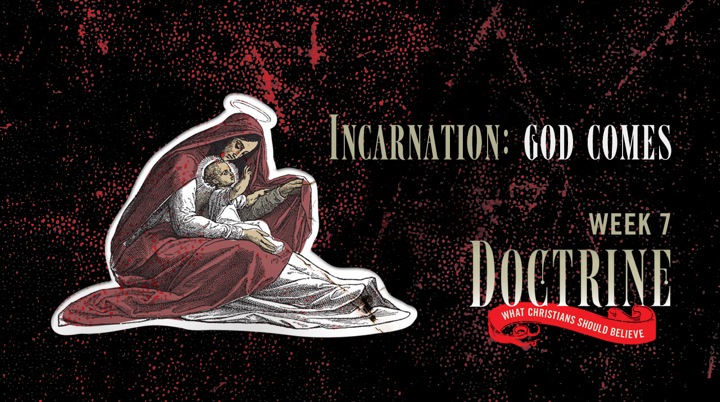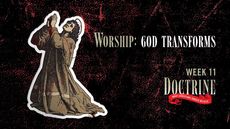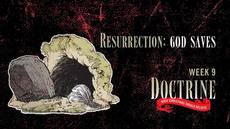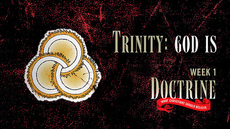
This week (Sunday, May 11) I preached the sermon Incarnation: God Comes as part of the Doctrine: What Christians Should Believe sermon series. This post is intended to help serve those in Mars Hill Church and those listening or watching online who wish to learn more about the doctrine.
Much of the content posted here is from Vintage Jesus: Timeless Answers to Timely Questions, written by my friend Dr. Gerry Breshears and myself. To further understand the person and work of Jesus, we would commend to you our book, which is now available in both print and audio form. I narrated the complete audio book, and it also includes some of my wandering commentary and quips that Crossway, our publisher, was kind enough to leave in for your enjoyment.
What Does Incarnation Mean? (see Vintage Jesus, p. 50)
The common jargon for the second member of the Trinity entering into history as a human being is the incarnation (from the Latin meaning "becoming flesh") (John 1:14; Phil. 2:5–6; Col. 2:9; 1 John 4:2). John 1:14 says the Word, the second person of the Trinity, became flesh. John’s point is that the eternal, invisible God took on a totally physical body so that we could see him. . . . It says he became "meat." Much like "chili con carne" where carne means "meat," the incarnation teaches that Jesus took upon himself a literal human body. Subsequently, incarnation ("in" plus "carne") means "in flesh."
How Did People Know God Was Coming? (see Vintage Jesus, pp. 57–60)
- 4000 B.C.: Adam and Eve receive the prophecy that the Messiah (Jesus) would be born of a woman (without reference to a father, intimating the virgin birth).
- Promise: "‘I will put enmity between you and the woman, and between your offspring and her offspring; he shall bruise your head, and you shall bruise his heel’" (Gen. 3:15).
- Fulfillment: "But when the fullness of time had come, God sent forth his Son, born of woman, born under the law . . ." (Gal. 4:4).
- 700 B.C.: Isaiah prophesies that Jesus’ mother would be a virgin who conceived by a miracle and that Jesus would be God who became a man.
- Promise: "‘Therefore the Lord himself will give you a sign. Behold, the virgin shall conceive and bear a son, and shall call his name Immanuel’" (Isa. 7:14).
- Fulfillment: "Now the birth of Jesus Christ took place in this way. When his mother Mary had been betrothed to Joseph, before they came together she was found to be with child from the Holy Spirit. And her husband Joseph, being a just man and unwilling to put her to shame, resolved to divorce her quietly. But as he considered these things, behold, an angel of the Lord appeared to him in a dream, saying, ‘Joseph, son of David, do not fear to take Mary as your wife, for that which is conceived in her is from the Holy Spirit. She will bear a son, and you shall call his name Jesus, for he will save his people from their sins.’ All this took place to fulfill what the Lord had spoken by the prophet: ‘Behold, the virgin shall conceive and bear a son, and they shall call his name Immanuel’ (which means, God with us)" (Matt. 1:18–23).
- 700 B.C.: Micah prophesies that Jesus would be born in the town of Bethlehem.
- Promise: "But you, O Bethlehem Ephrathah, who are too little to be among the clans of Judah, from you shall come forth for me one who is to be ruler in Israel, whose coming forth is from of old, from ancient days [eternity]" (Mic. 5:2).
- Fulfillment: "In those days a decree went out from Caesar Augustus that all the world should be registered. This was the first registration when Quirinius was governor of Syria. . . . And Joseph also went up from Galilee, from the town of Nazareth, to Judea, to the city of David, which is called Bethlehem, because he was of the house and lineage of David, to be registered with Mary, his betrothed, who was with child. And while they were there, the time came for her to give birth. And she gave birth to her firstborn son and wrapped him in swaddling cloths and laid him in a manger, because there was no place for them in the inn" (Luke 2:1–7).
- 400 B.C.: Malachi prophesies that Jesus would enter the temple. This is important because the temple was destroyed in A.D. 70 and no longer exists; subsequently, the prophecy could not have been fulfilled anytime after A.D. 70.
- Promise: "Behold, I send my messenger and he will prepare the way before me. Then suddenly the Lord whom you seek will come to his temple; and the messenger of the covenant in whom you delight, behold, he is coming, says the Lord of hosts" (Mal. 3:1).
- Fulfillment: "Now there was a man in Jerusalem, whose name was Simeon, and this man was righteous and devout, waiting for the consolation of Israel, and the Holy Spirit was upon him. And it had been revealed to him by the Holy Spirit that he would not see death before he had seen the Lord’s Christ. And he came in the Spirit into the temple, and when the parents brought in the child Jesus, to do for him according to the custom of the Law . . ." (Luke 2:25–27).
How Did God Come? (see Vintage Jesus, pp. 100–101)
In the sixth month the angel Gabriel was sent from God to a city of Galilee named Nazareth, to a virgin betrothed to a man whose name was Joseph, of the house of David. And the virgin's name was Mary. And he came to her and said, "Greetings, O favored one, the Lord is with you!" But she was greatly troubled at the saying, and tried to discern what sort of greeting this might be. And the angel said to her, "Do not be afraid, Mary, for you have found favor with God. And behold, you will conceive in your womb and bear a son, and you shall call his name Jesus. He will be great and will be called the Son of the Most High. And the Lord God will give to him the throne of his father David, and he will reign over the house of Jacob forever, and of his kingdom there will be no end."
And Mary said to the angel, "How will this be, since I am a virgin?"
And the angel answered her, "The Holy Spirit will come upon you, and the power of the Most High will overshadow you; therefore the child to be born will be called holy—the Son of God. And behold, your relative Elizabeth in her old age has also conceived a son, and this is the sixth month with her who was called barren. For nothing will be impossible with God." And Mary said, "Behold, I am the servant of the Lord; let it be to me according to your word." And the angel departed from her. (Luke 1:26–38)
Mary is not to be our object of faith but rather our example of faith in Jesus. Imagine her emotions when she’s told that she will be pregnant without being married in a society that shamed, humiliated, exiled, or even killed such women. Tradition says they would take her to the gate of the city, rip off her clothes, dress her in rags, tie her up, and bring all the women to see her and learn the lesson of shame through her suffering. Joining them as witnesses would have been the worst kind of vile men who simply enjoyed watching women getting stripped and beaten.
But Mary knew the promises of Isaiah. She lived by the power of God. So instead of saying, "Count me out. I just want a nice life," she immediately accepted God’s very difficult call on her life, saying, "Behold, I am the servant of the Lord; let it be to me according to your word" (Luke 1:38). Hers is a faith for anyone to follow.
The first snapshot of the early church singles out Mary for mention as a woman of prayer. She is pointed out among the one hundred twenty people in the Upper Room worshiping Jesus as the only God before the Holy Spirit was poured out on the day of Pentecost (Acts 1:13–14).
Mary is a wonderful example for all Christians, particularly women, and especially young women. She obviously loved God, and, while not sinless like her son, she did live in holiness as marked by her virginity until marriage. She is an inspiring example that our sexually promiscuous culture desperately needs to have modeled through women like her. We all need to follow her example of humble faith that fully trusted God’s will for her life.
Martin Luther deftly commented that while the virgin conception was God’s greatest miracle in Mary’s life, the fact of her faith in God was perhaps her greatest miracle of all (Bloesch, Jesus Christ: Savior and Lord, 86). It is our prayer that you would, by God’s grace, follow in the wonderful example of a remarkable teenage girl who was honored by God with the birth and raising of the Lord Jesus Christ, Immanuel, God with us, who came to save us sinners from our sins. Beautifully, our new birth through Jesus is patterned after the birth of Jesus in that both are miracles wrought entirely of God to be received in faith.
Was Jesus Fully God? (see Vintage Jesus, pp. 21–22)
Jesus clearly, emphatically, and repeatedly said he is God. If his statements were untrue, it would have been a blasphemous violation of the first commandment. The belief that Jesus is God is not something that Christians made up, but rather something that Christians believe because it was taught by Jesus himself. Many cults wrongly deny that Jesus is God or ever claimed to be God. For example, the Jehovah’s Witnesses Watchtower Society says, "Jesus never claimed to be God" ("Is God Always Superior to Jesus?"). Bahá’ís say that Jesus was a manifestation of God and a prophet but inferior to Muhammad and Bahá’u’lláh. Buddhism teaches that Jesus is not God but was rather an enlightened man like the Buddha. Christian Science founder Mary Baker Eddy flatly states, "Jesus Christ is not God."
Some key Scriptures illustrate how Jesus clearly said he is God and his hearers clearly understood his unparalleled claim. Mark 14:61–64 reports, "He remained silent and made no answer. Again the high priest asked him, ‘Are you the Christ, the Son of the Blessed?’ And Jesus said, ‘I am, and you will see the Son of Man seated at the right hand of Power, and coming with the clouds of heaven.’ And the high priest tore his garments and said, ‘What further witnesses do we need? You have heard his blasphemy. What is your decision?’" John 8:58–59 reports that Jesus said, "‘Truly, truly, I say to you, before Abraham was, I am.’ So they picked up stones to throw at him, but Jesus hid himself and went out of the temple."
Jesus claimed eternality in saying that he existed before Abraham, who lived roughly two thousand years prior. Furthermore, in naming himself "I am," Jesus was declaring himself to be the same God who revealed himself by the title "I am" some fourteen hundred years prior when he spoke to Moses through the burning bush. As a result, those who heard Jesus rightly understood him as declaring himself to be the eternal God who saved Abraham and called Moses. Consequently, they called him a blasphemer for being a man who claimed to be God and sought to impose the death penalty on him for it.
In John 10:30–33 Jesus also said, "I and the Father are one." Then, "The Jews picked up stones again to stone him. Jesus answered them, ‘I have shown you many good works from the Father; for which of them are you going to stone me?’ The Jews answered him, ‘It is not for a good work that we are going to stone you but for blasphemy, because you, being a man, make yourself God.’"
On this point, New York’s Judge Gaynor once said of Jesus’ trial at the end of his earthly life, "It is plain from each of the gospel narratives, that the alleged crime for which Jesus was tried and convicted was blasphemy" (Quoted in Charles Edmund Deland, The Mis-Trials of Jesus (Boston, Mass.: Richard G. Badger, 1914), 118–119).
Throughout the history of the world, numerous people have claimed to speak for God. Yet there is a surprisingly short list of people who have actually claimed to be God. For example, such religious leaders as Buddha, Krishna, Muhammad, and Gandhi did not claim to be God. In fact, they assured their followers that they were not God. Jesus, in contrast, clearly and repeatedly said he is God.
In the beginning was the Word, and the Word was with God, and the Word was God. He was in the beginning with God. All things were made through him, and without him was not any thing made that was made. In him was life, and the life was the light of men. The light shines in the darkness, and the darkness has not overcome it.
There was a man sent from God, whose name was John. He came as a witness, to bear witness about the light, that all might believe through him. He was not the light, but came to bear witness about the light.
The true light, which enlightens everyone, was coming into the world. He was in the world, and the world was made through him, yet the world did not know him. He came to his own, and his own people did not receive him. But to all who did receive him, who believed in his name, he gave the right to become children of God, who were born, not of blood nor of the will of the flesh nor of the will of man, but of God.
And the Word became flesh and dwelt among us, and we have seen his glory, glory as of the only Son from the Father, full of grace and truth. (John bore witness about him, and cried out, "This was he of whom I said, ‘He who comes after me ranks before me, because he was before me.’") And from his fullness we have all received, grace upon grace. For the law was given through Moses; grace and truth came through Jesus Christ. No one has ever seen God; the only God, who is at the Father's side, he has made him known. (John 1:1–18)
The Hebrew people at the end of the first century clung tightly to their proud religious heritage extending from Abraham to Isaac, Jacob, Moses, David, and a host of priests and prophets. At the center of their theology was a devotion to the Word of God. The sacred Scriptures of the Old Testament were penned in their native tongue by their Hebrew brothers with nothing less than the authority of God as his divine voice through appointed men. To the Hebrews, the Word of God was the presence and action of God breaking into human history with unparalleled power and authority. God’s Word was a happening, such as creating (Gen. 1:3, 6, 11), and was never given without accomplishing its purpose (Isa. 55:11). For the Hebrew, God’s speech and action were one and the same.
The Greek people living at the end of the first century also clung tightly to their proud heritage, a philosophical heritage extending from Heraclitus (540–480 B.C.), to Socrates (470–399 B.C.), Plato (428–348 B.C.), Aristotle (384–327 B.C.), Cicero (106–43 B.C.), and a host of philosophers, poets, and playwrights. At the fountainhead of Greek philosophy was Heraclitus, who was known as the "weeping philosopher." His image could be found on the coins in Ephesus for several centuries following his death. In his three-volume work On Nature covering cosmology, politics, and theology, Heraclitus taught that the world was created by fire and maintained an intricate balance between constant flux and overriding stability. He illustrated this point by penning the now famous claim that a person never steps into the same river twice because of its constant change. For Heraclitus, the creation of the world, the ordering of all life, and the immortality of the human soul were all made possible solely by the word (or logos) that was the invisible and intelligent force behind all that we see in this world. Also, it was the word through which all things were interrelated and brought into harmony, such as life and death, good and evil, darkness and light, and the gods and people. He went so far as to say that truth could only be known and wisdom, the great aim of Greek existence, could only be found not in a knowledge of many things, but instead a deep and clear awareness of one thing—the word, or logos.
Jesus Christ was born of a virgin as the one true God who became a man during a time and place in which the Hebrew and Greek worlds collided. John’s missionary move was pivotal at that time in the development of the early church. John sought to remain loyal to the Hebrew heritage and the Old Testament Scriptures, priests and prophets, and Jesus himself, while still seeking to further the fruitful work of the gospel into the larger world dominated by Greek philosophy and language. Complicating things all the more was the fact that, according to William Barclay, "By 60 AD there must have been a hundred thousand Greeks in the church for every Jew who was a Christian. Jewish ideas were completely strange to the Greeks. To take but one outstanding example, the Greeks had never heard of a Messiah. . . . The very category in which Jewish Christians conceived and presented Jesus meant nothing to them." The obvious dilemma was how to faithfully and accurately present Jesus to the Greek world.
So, John wrote his biography of Jesus in the Greek language and began with the concept of the word, which was common ground in the presuppositions of both Hebrew theology and Greek philosophy.
Logos is from the Greek word meaning "word, or reason." It was used by the ancient Greeks to convey the idea that the world was governed by a universal intelligence, similar to pantheism. In Johannine literature, John used "logos" differently than other writers, to refer to the second person of the Trinity, Jesus Christ. John’s meaning of logos has been greatly disputed and interpreted by a host of scholars fearing the implications of it proving the deity of Christ.
The Jewish philosopher and historian Philo also taught his understanding of the logos around A.D. 25. Dualistic, and much like early Gnosticism, Philo taught that God is spirit and good, but that all matter was evil. Therefore, God could not have created or taken on the material lest he sin. He concluded that both God and matter were eternal, and that an intermediary existed that permitted God to interact with the material world. This he called the Logos.
In the New International Commentary on the New Testament on the Gospel of John, Leon Morris gives insight into the Jewish concept of "the Word" from the Jewish Targums (Old Testament paraphrases) where Jews substituted "God" for "the Word of God" out of reverence for his name. For example, where the Bible says, "Then Moses brought the people out of the camp to meet God" (Ex. 19:17), the Targum reads ". . . to meet the Word of God."
Also, in the Old Testament, the "word of God" indicated action, an agent accomplishing the will of God. Some examples include God bringing things into existence by his word (Gen. 1:3, 6, 9, 14, 20, 24; Ps. 33:6), and God’s word being sent out to accomplish the purposes of God (Isa. 55:11).
John begins with a declaration that both Hebrews and Greeks would have agreed with, that before the creation of the world and time, the Word existed eternally. He then scandalizes both groups by stating that Jesus is the Word and was with the one and only God, and in fact was himself God, and was face to face with God from eternity (John 1:1–2). This thundering declaration would have been stunning to both Jews and Greeks who had vigorously argued that a man could never become a god, though John’s eyewitness testimony that God had become a man they may have never considered.
John then explains that the word is not merely the invisible force of the Greeks, or the agent of God’s action for the Hebrews, but a person through whom all things were created (John 1:3; cf. Col. 1:16), and a person in whom is life and light for men (John 1:4). This light that exposes sin and reveals God has come into the darkness of this sinful, cursed, and dying world and the darkness has opposed his light but was unable to understand or overcome him (John 1:5; cf. 1 John 1:5–10; 2:8–11).
He then writes that Jesus was the Word of God who came in human flesh to dwell among people and bring both grace and truth from the Father in the same way that God’s glorious presence dwelt in the tabernacle tent among the tents of the Hebrew people in the wilderness wanderings of the Exodus (John 1:14). John the Baptizer cried out that Jesus was greater than he and worthy of greater honor because though John was born first, Jesus had existed from eternity past (John 1:15).
John then concludes by describing the gifts given to those who believe, such as grace, blessings, grace, truth, and a perfect window through which to see God the Father (John 1:17–18).
It is important to note that John was fully monotheistic in his understanding of God. He would have understood that magnitude of what he was saying, and as a result, very clearly outlined his position. John was acutely aware and intentional in his revolutionary teaching regarding the five aspects of this Logos.
First, the Logos is eternal (John 1:1–2). According to Ron Rhodes, "‘In the beginning’ (Greek, en archei) refers to a point in eternity past beyond which it is impossible for us to go. Moreover, the verb was (‘in the beginning was the Word’) is an imperfect tense in the Greek, indicating continued existence" (The Counterfeit Christ of the New Age Movement, p. 215).
Second, the Logos has always been with God (John 1:2).
Third, the Logos is a person distinct from, yet equal to God (John 1:1–2). As Rhodes has said, "the Greek preposition pros implies two distinct persons." Therefore, while the Father and the Logos are not the same, they do belong together as one.
Fourth, the Logos is the creator (John 1:3)
Fifth, the Logos became flesh (John 1:14). In refutation of the Gnostics and dualistic teachings of Philo, John clearly taught that matter is not inherently evil and that God does involve himself with the material. It is also noteworthy that the Logos "pitched his tabernacle among us." This imagery relates to the tabernacle that God had the Israelites build as his sanctuary so that he might dwell in their midst (Ex. 25:8). Implicitly, we are told that the Logos that was present in the sanctuary became physically present in the space and time world.
How John uses the word Logos elsewhere in his writings is also insightful. First John 1:1 indicates that John and others had heard, seen, and touched the Logos, "which was from the beginning." Again, this seems to be a clear reference to Jesus Christ. Revelation 19:12–13 also pictures Christ as the conquering general, the Logos of God.
As George Eldon Ladd observes in his Theology of the New Testament, the Logos became flesh for five reasons. To reveal to man life (John 1:4), light (John 1:4–5), grace (1:14), truth (1:14), glory (1:14), even God himself.
In summary, the Logos is one of the strongest arguments for the deity of Jesus as the eternally existing, personal creator of the universe distinct from, yet equal with, God who came in the flesh to demonstrate his glory in grace and truth to reveal life and light to men.
Was Jesus Fully Human? (see Vintage Jesus, pp. 33–36)
In sum, Jesus looked like a normal, average dude. Or, in the words of the prophet Isaiah, "He had no form or majesty that we should look at him, and no beauty that we should desire him" (Isa. 53:2). Indeed, when we examine the life of Jesus as told in Scripture, we see a man who does not appear at first glance to be God. Conversely, Jesus appears as a radically normal and average human being experiencing normal life events like the rest of us:
- Born of a woman (Gal. 4:4)
- Had a normal body of flesh and bones (Luke 24:39)
- Grew up as a boy (Luke 2:52)
- Had a family (Matt. 13:54–58; Mark 6:3; 1 Cor. 9:5)
- Obeyed his parents (Luke 2:51)
- Worshiped God (Luke 4:16) and prayed (Mark 1:35; 6:46)
- Worked as a carpenter (Mark 6:3)
- Got hungry (Matt. 4:2; 21:18) and thirsty (John 4:7; 19:28)
- Asked for information (Mark 9:16–21; John 11:34; 18:34)
- Was stressed (John 13:21)
- Was astonished (Mark 6:6; Luke 7:9)
- Was happy (Luke 10:21–24; John 15:11; 17:13; Heb. 12:2, 22)
- Told jokes (Matt. 7:6; 23:24; Mark 4:21)
- Had compassion (Mark 1:41; Luke 7:13)
- Had male and female friends he loved (John 11:3–5)
- Gave encouraging compliments (Mark 12:41–44)
- Loved children (Matt. 19:13–15)
- Celebrated holidays (Luke 2:41)
- Went to parties (Matt. 11:19)
- Loved his mom (John 19:26–27)
There are two general ways in which various thinking has erred regarding the humanity and divinity of Jesus. The first is to deny the full divinity of Jesus in favor of his humanity; the second is to deny the full humanity of Jesus in favor of his divinity.
The denial of the full divinity of Jesus has been done by heretics such as the Ebionites, Dynamic Monarchianists, Nestorians, modalists, monarchianists, Sabellianists, Unitarians, Social Gospel proponents, "death of God" theologians, liberals, Arians, Jehovah’s Witnesses, Mormons, functionalists, Adoptionists, Kenotics, Apollinarians, and more recently by the popular book and film The Da Vinci Code. According to the Jehovah’s Witnesses cult, Jesus was created by God the Father billions of years ago as the archangel Michael and is not God equal to the Father (Watch Tower Bible and Tract Society of Pennsylvania, "The Truth About Angels," What Can Angels Do for You? Watchtower Society online edition, November 1, 1995, //www.watchtower.org/library/w/1995/11/1/article_02.htm). The Mormon cult teaches that Jesus was born as the first and greatest spirit-child of the Heavenly Father and Heavenly Mother, and is also the spirit-brother of Lucifer who became a god but whose deity is no more unique than many people’s. Some New Agers say Jesus was not fully God and fully man, but rather half man and half alien. Oneness Pentecostals falsely teach that there is no Trinity but rather that Jesus appears in the roles of Father, Son, and Spirit. . . . .
The denial of the full humanity of Jesus has been done by heretics such as Docetists, Gnostics, Modal Monarchianists, Apollinarian Paulicians, Monophysitists, New Agers, and Eutychians. . . .
In A.D. 451, the Council of Chalcedon met to wrestle with the confusion that surrounded the divinity and humanity of Jesus. They issued the Chalcedonian Creed, which cleared up many heresies that wrongly defined the humanity and divinity of Jesus. In sum, the creed declared that Jesus Christ is one person with two natures (human and divine) who is both fully God and fully man. Theologically, the term for the union of both natures in Jesus Christ is hypostatic union, which is taken from the Greek word hypostasis for "person." The renowned German pastor Dietrich Bonhoeffer said, "The Chalcedonian definition is an objective, but living, statement which bursts through all thought forms" (Dietrich Bonhoeffer, Christ the Center (New York: Harper, 1978), 92). The Chalcedonian summary of the incarnation is the position held by all of Christendom, including Orthodox, Catholic, and Protestant Christians.
How Could God Become a Man? (see Vintage Jesus, pp. 36–37)
Have this mind among yourselves, which is yours in Christ Jesus, who, though he was in the form of God, did not count equality with God a thing to be grasped, but made himself nothing, taking the form of a servant, being born in the likeness of men. And being found in human form, he humbled himself by becoming obedient to the point of death, even death on a cross. Therefore God has highly exalted him and bestowed on him the name that is above every name, so that at the name of Jesus every knee should bow, in heaven and on earth and under the earth, and every tongue confess that Jesus Christ is Lord, to the glory of God the Father. (Phil. 2:5–11)
This amazing section of Scripture reveals to us that the second member of the Trinity came into human history as the man Jesus Christ. In doing so, Jesus exemplified perfect and unparalleled humility. The Creator entered his creation to reveal God to us, identify with us, and live and die for us as our humble servant. Saying that Jesus "made himself nothing" means that he set aside his rights as God and the rightful continual use of his divine attributes, with the occasional exception such as to forgive sin, and though he was still God, he chose instead to live by the power of the Holy Spirit. This does not mean that Jesus in any way ceased to be God, but rather chose not to avail himself of his divine rights and attributes while on the earth.
In keeping with the biblical position of Chalcedon, we must retain both the full divinity and full humanity of Jesus Christ. To accomplish this, we must conclude that when Jesus became a man, he did not change his identity as God but rather changed his role. According to the church father Augustine, "Christ added to himself which he was not, he did not lose what he was" (Quoted in G. C. Berkouwer, The Person of Christ, trans. John Vriend (Grand Rapids, Mich.: Eerdmans, 1954), 94).
Jesus, who was fully equal with God in every way, who was the very form of God, did not see that as something to keep in his grip, but emptied himself of that equal status and role to take the status and role of humanity. He who was and is God took the likeness of humanity. God became the "image of God" for the sake of our salvation (Gen. 1:27; 2 Cor. 4:4).
Theologians capture this laying aside of the divine equality, the divine lifestyle, with the phrase he laid aside the independent exercise of his divine attributes. What this means is that he didn’t continually exhibit the so-called incommunicable attributes such as his immortality, omniscience, or omnipresence, except at the leading of the Holy Spirit.
Therefore, while Jesus remained fully man and fully God during his incarnation, he maintained all of his divine attributes and did avail himself of them upon occasion, such as to forgive human sin, which God alone can do (Mark 2:1–7). The Bible is clear, however, that even when not availing himself of his divine attributes, he did in fact retain them. For example, in 1 Timothy 1:17, Jesus is the King who has the divine attributes of eternality, immortality, and invisibility and is called "the only God." According to other Scriptures, Jesus’ other divine attributes possessed by him during his life on earth include omnipresence (Ps. 139:7–12; Matt. 28:20), creator (Isa. 37:16; 44:24; John 1:3; Col. 1:16; Heb. 1:2), savior (Joel 2:32; Rom. 10:9–13), and deity as the only God (Isa. 45:21b–23; Phil. 2:10–11). In summary, Jesus did not in any way cease to be fully God while on the earth, but rather as Philippians 2:5–11 shows, he humbly chose not always to avail himself of his divine attributes.






